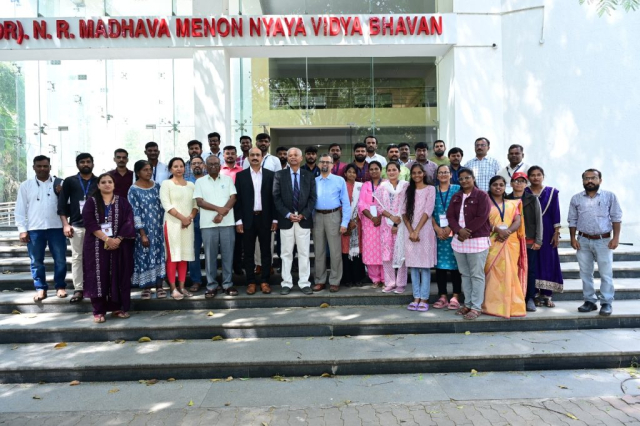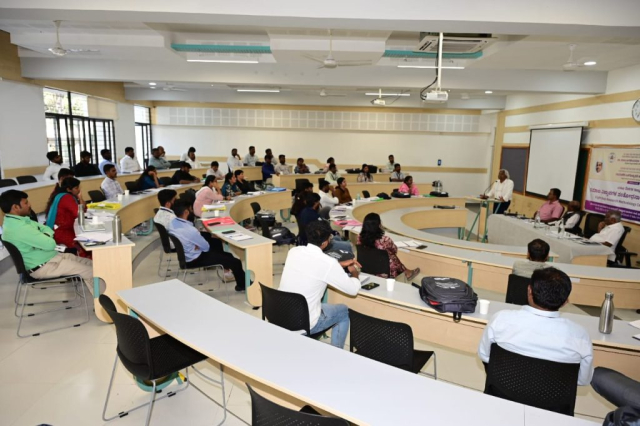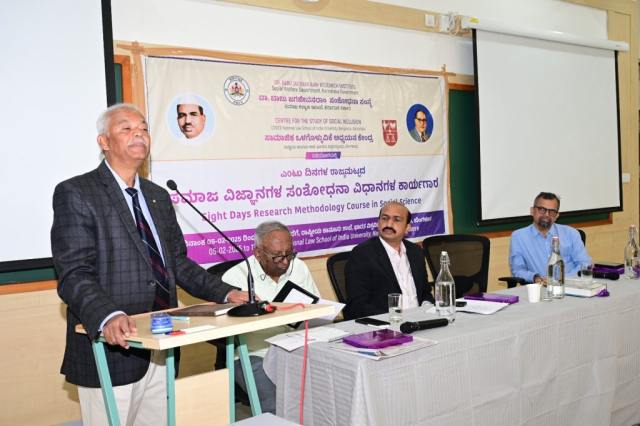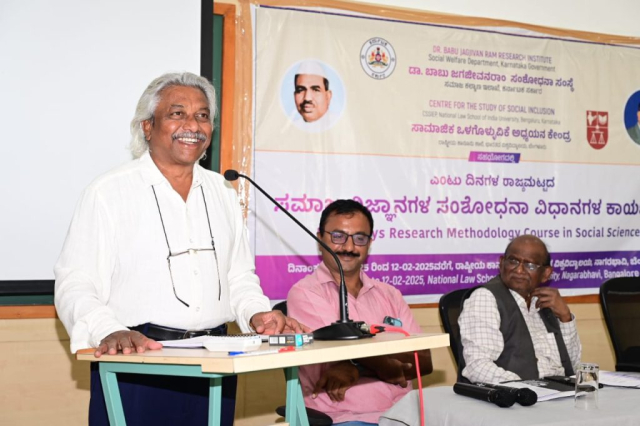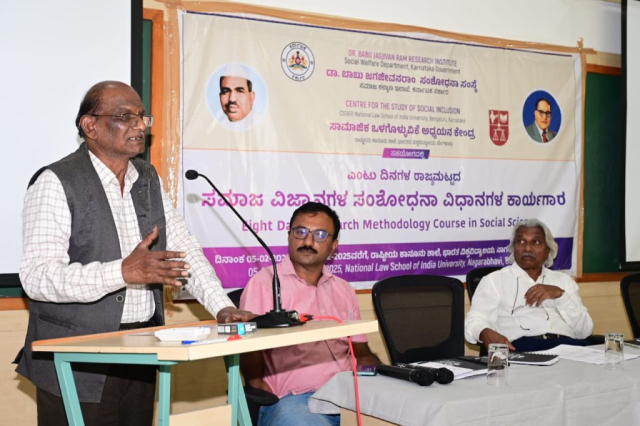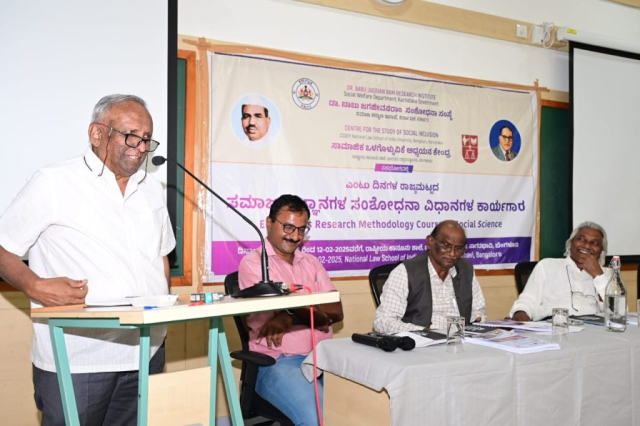Eight-Day Research Methodology Course in Social Science | Centre for the Study of Social Inclusion, NLSIU & Dr. Babu Jagjivan Ram Research Institute
NAB, NLSIU Campus
Wednesday, February 5, 2025
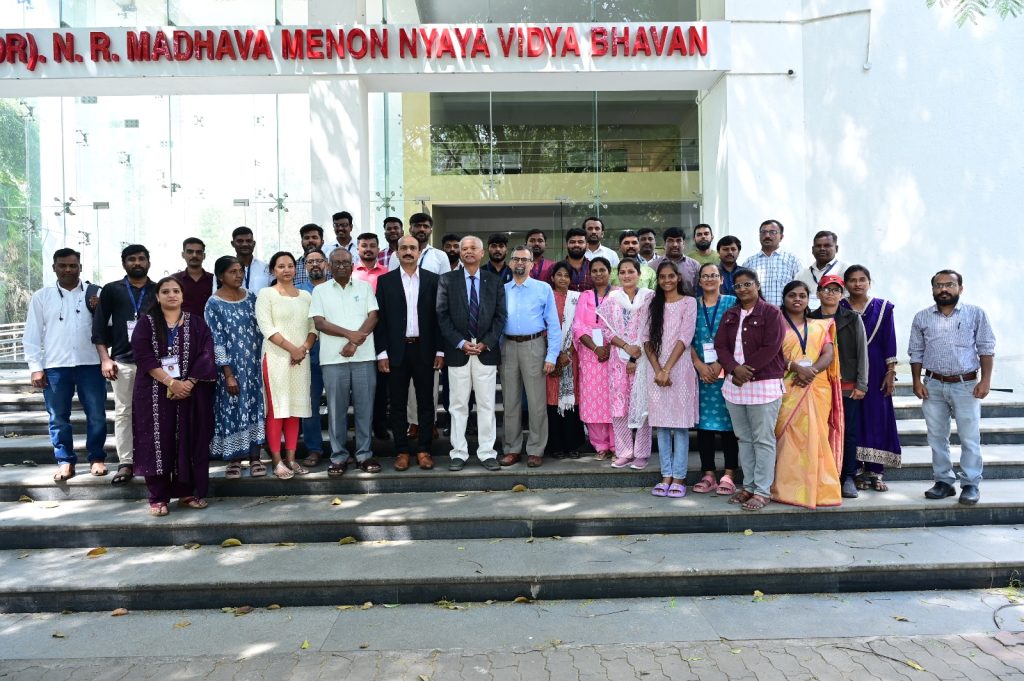 The Centre for the Study of Social Inclusion (CSSI) at the National Law School of India University (NLSIU), Bengaluru, in collaboration with the Dr. Babu Jagjivan Ram Research Institute, Department of Social Welfare, Government of Karnataka, organised an eight-day research methodology course in social science from February 5 to 12, 2025 at the NLSIU campus.
The Centre for the Study of Social Inclusion (CSSI) at the National Law School of India University (NLSIU), Bengaluru, in collaboration with the Dr. Babu Jagjivan Ram Research Institute, Department of Social Welfare, Government of Karnataka, organised an eight-day research methodology course in social science from February 5 to 12, 2025 at the NLSIU campus.
The programme was designed for PhD scholars, researchers, and think tanks from various universities in the state. The diverse group of 50 scholars were selected from across 18 universities in Karnataka, with priority to scholars from SC/ST, OBC categories and women PhD scholars.
Workshop Coordinator:
Dr. R.V. Chandrashekar,
Research Assistant,
Centre for the Study of Social Inclusion (CSSI), NLSIU
Aim of the course
Research is an integral part of the growth and expansion of social sciences. Its importance is enhanced much more in a modern, globalised society where development has attained additional dimensions. Social science research faces a challenge to thoroughly equip itself to meet the ever growing needs of the society that is transforming at a rapid pace. Often, demarcations (into rural, urban, caste, gender, etc.) are blurred by the advancement in technology and changing socio-economic scenarios. Societal problems are assuming wide-ranging complexities and under these circumstances, it becomes imperative to approach research from a preliminary and systematic understanding of the methods in social science research since the methods have also expanded enormously in their scope and application over a period of time.
Focus of the course
Research methodology, a critical component of training for any social science research programme, seldom receives the attention it deserves in most academic institutions in India. Methodologies are often conflated with methods and techniques of data analyses, with limited understanding of the epistemological frameworks or logic underlying various techniques and methods. Even among techniques, quantitative methods are over-privileged as more scientific, Social sciences are also increasingly drawing on developments in natural sciences and technology studies to enhance their explanatory domain. All of this has strengthened the scope for trans-disciplinary dialogue and research integrating perspectives and tools from varied disciplines.
Content of the course
- Nature of knowledge and theory: theoretical approaches to social science research.
- The art of doing research: selection of a research problem, research design, formulating hypotheses and indicators, and methods of sampling and inference.
- Statistics and econometrics with hands-on experiences.
- Qualitative and quantitative methods; ethnographic studies; case studies; new advances in methods of social science research.
- Ethical and gender issues in social science research; Action research.
- Interpreting research;
- Consolidation of research findings, research report and dissemination
- Exposure of statistical packages like SPSS, STATA etc.
Additionally, the course also explored the converse enumerate scientific method and its basic postulates, data analysis, basic tools in SPSS, qualities of good research, steps in conducting research, ethics of research, types of research, and research design.
Reflections from the course
The course was attended by 50 researchers from socially disadvantaged communities who gained knowledge on the importance of quality research and its benefits.
Skilled resource persons participated in the eight-day course to demonstrate research problems and how and when to use different technologies, how to conduct analyses, how to use library and internet information in research, how to write reports, and the importance of interdisciplinary studies.
The participating scholars expressed that courses like these should be conducted at all the universities in Karnataka as research would benefit from the training. The participants discussed the need for conducting such training courses for research mentors and that at least two such sessions should be organised at the state level each year.
Inauguration
The course was inaugurated on February 5, 2025, by Sri N.C. Muniyappa IAS (Retd), Former Chief Secretary, Karnataka. He shared his life experiences and the challenges he faced during his student life, motivating the participating research scholars through his own stories as a junior research fellow (JRF). He also spoke about his journey as a scientist in the agriculture department, before his work as an IAS officer in various departments in the state of Karnataka.
The presidential remarks were delivered by Prof. Babu Mathew, Director, Centre for Labour Studies at NLSIU.
Valedictory
The course ended with a valedictory ceremony on February 12, 2025. The valedictory speech was delivered by Dr. E. Venkataiah, IAS (Retd.), SCSP/TSP Nodal Agency Advisor, Department of Social Welfare, Government of Karnataka. The chief guest for the programme was Sri Rajesh G. Gowda, Director of Dr. Babu Jagjivan Ram Research Institute.


